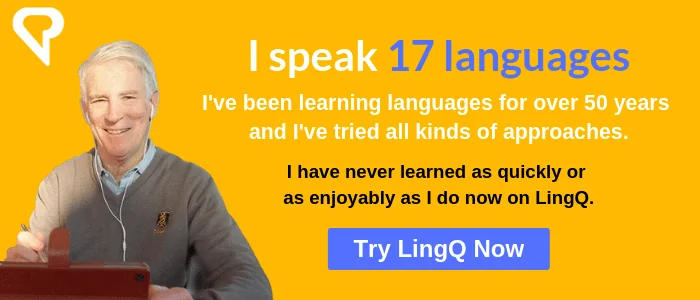Because learning languages is a big part of success, people who don’t enjoy learning languages are less likely to be successful. You can’t force yourself to do something that involves your emotions, involves a commitment to sort of imitating another language and culture and getting outside of the comfort of your language, one that you’re used to and able to express yourself. You’re forcing yourself out of that and you have to enjoy the process or you won’t do it. So why do I enjoy it?
First of all, when I am learning languages, when I’m engaged in any activity, whether it be reading or listening or maybe I have an online discussion with a tutor, I really feel that what I am doing is valuable and it’s valuable for a variety of reasons. First of all, I actually enjoy it. I enjoy discovering a new language, how a new language works, how they count in Turkish, all the different things they do that are different from Farsi or Persian, different from Chinese, different from English. So I enjoy discovering that. I know, say in Turkish, that I am going to get to a point where I can actually read things of interest in Turkish. I’ll be able to read about Turkish history, the Ottoman Empire, whatever it might be, all of these things in Turkish. I’m looking forward to that so there’s a sense of anticipation.
I know what I am doing is going to benefit me in terms of learning the language. So I enjoy what I’m doing. I know that I’m going to get through what I’m doing — the ability to speak and understand the language — and I know that I am going to be able to access so many things that I wasn’t able to access before. Therefore, the time that I spend is valuable. So I focus on that, all of the positive things that come from learning the language. Therefore, it’s a valuable thing to do.
I don’t worry so much about what I’m able to say. I think sometimes people who are concerned about how much they can say and how quickly they can say it are more likely to get frustrated because actually it’s very difficult. I can have a lot of words that I have learned that I understand passively, that I’ve read many times, I’ve heard many times and then I have a conversation with my tutor and I can’t find those words. I can’t even find some of the most basic words. Often, why, or anything, all of a sudden is blank.
If a major sense of achievement comes from being able to say something in the language then it’s very easy to get frustrated. To me, it’s that sense of discovery and looking forward to all the additional things I can discover. For example, my wife and I were watching this very amusing Turkish soap opera. Parts of it take place in Istanbul. We’re going to go to Turkey and I’m going to be able to speak Turkish when we go to Turkey. I may make mistakes when I’m in Turkey, but I’m going to have a level of access to this culture and this language that I would never have without having learned the language.

All of this sort of fills me with a sense of discovery and I know I am progressing. Even when I don’t feel that I am progressing, I know that I am progressing. I don’t judge my progress by how well I did in my last conversation with my tutor. I don’t even worry about my progress. I know that I am reading better than before. I know, for example, my mini stories for Turkish, and the same is true for Persian and Arabic, that when I started it was just noise. I couldn’t figure out what they were saying, what words meant and how they fit together and now I would say at least 50 of the 60 stories I understand perfectly. So I have achieved something, even if I struggle to use these words and even if I make mistakes and I make the same mistakes over and over again. It’s difficult to nail the tenses in Turkish, but I know also that in time it will get better if I just continue doing what I’m doing. It’s enjoyable to me.
The other thing about language learning for me is, first of all, I’m retired, so there is no limit to how much I can improve in any language or how many new languages I can discover. It’s essentially limitless. My whole retirement is full. Whatever else I have going, if there’s a slow moment I can go back to learning languages and learning languages the way I do heavily relies on listening. It makes household tasks enjoyable. Cleaning up in the garage, working out, in the car, I can always listen.
Of course, listening is not enough. Listening is a big part of sort of engraining the phrases and words into your brain in a way that you’ll be able to use them, but reading is also key in order to expand your vocabulary. I do combine both of them, but the listening is so easy to organize and it makes the everyday tasks enjoyable. I don’t mind cleaning up; I’m going to listen to Turkish. It’s enjoyable when I understand it so much better than I used to understand it. Those are my call them milestones of achievement.
I enjoy languages because of the discovery. I enjoy languages because I know that it’s an exercise in discovery, but also it leads you to these other things. Friends that I’ll be able to make, I’ll be able to have dinner conversations in Turkish when we visit Turkey, so there’s all of this positive anticipation.
There are moments in life when we have a pleasant evening with friends, but that’s all you get is that evening then it’s gone. Now you have the memory maybe. Moments of enjoyment can be fleeting in life, but with language learning it’s sort of like you get a triple punch. You get the enjoyment of the activity, at least it is for me, you get the discovery of the language and then you get all of the things that that’s going to lead to. So it’s an investment in future enjoyment in a way that a wonderful meal and a nice bottle of wine is an investment in the enjoyment of that evening and perhaps the memory of it, but you aren’t necessarily investing in many, many good things to come.
So that’s my view. I do enjoy learning languages. I’m not tired of it. If I get tired of language A I move to language B. Whatever I have put into a language, however little I have achieved in the language, it’s still been a positive experience, a positive discovery and it’s also something that I can go back to.
So my Greek and my Romanian, which are the two call them stunted languages in my repertoire, I have all my mini stories. If I start listening to them I understand them all. I can go back to those and placed in a situation where I had to use it I’d quickly be able to bring it back to where it was. It’s the same with my three Middle Eastern languages now, Arabic, Persian and Turkish. I’m focused now on Turkish. I’m slipping a bit in Persian and Arabic, but occasionally I look at my Assimil book in those languages or I listen to a mini story in the car and it all comes back to me, so nothing is lost.
So there you have it. That’s why I enjoy learning languages. I would like to hear from you why you enjoy learning languages or why you don’t enjoy learning languages. Okay, thank you. Bye for now.







4 comments on “Why I Enjoy Learning Languages”
Comments are closed.
Excellent post, Steve. 🙂
I always enjoy reading them
Thank you
With sincere gratitude,
Ramona (from Romania)
I love learning languages. I know Spanish, Portuguese, Japanese and German. And learning languages will never stop for me.